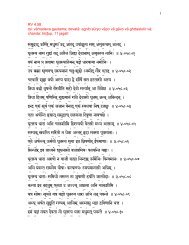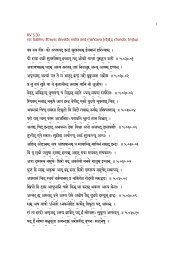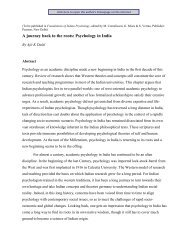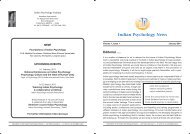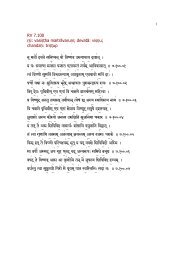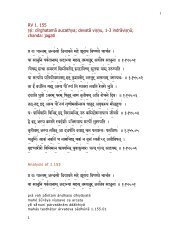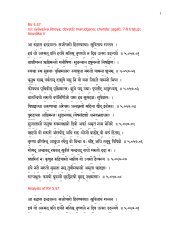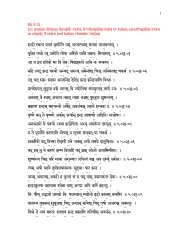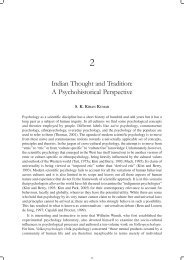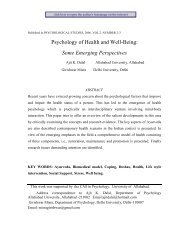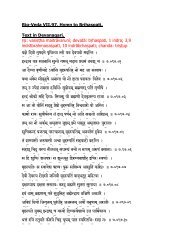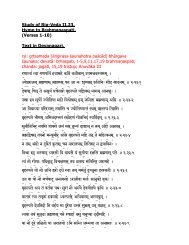core and Context -Fi.. - Indian Psychology Institute
core and Context -Fi.. - Indian Psychology Institute
core and Context -Fi.. - Indian Psychology Institute
You also want an ePaper? Increase the reach of your titles
YUMPU automatically turns print PDFs into web optimized ePapers that Google loves.
for the uplift of humanity in general instead of the people of <strong>Indian</strong> origin only. IP thrived<br />
on protest movements, as Buddhism <strong>and</strong> Jainism were <strong>and</strong> also on other philosophies of the<br />
region, such as Zorostrianism <strong>and</strong> Sufism. Its influence in the ancient times was far beyond<br />
the borders of greater India, Tibet, China, Japan <strong>and</strong> Korea <strong>and</strong> in the south up to Sri Lanka,<br />
Malayasia <strong>and</strong> Indonesia. In the west, Afghanistan, Iran <strong>and</strong> up to middle Asia (see<br />
Winternitz, 1927). IP was in communion with other contemporary philosophies of the East,<br />
such as Tao, Zen Buddhism, <strong>and</strong> this mutual influence is very much visible even today.<br />
They provided the intellectual <strong>and</strong> spiritual firmament to generate new ideas <strong>and</strong><br />
explanations as evident in post- Upanishad texts (such as Shankar‟s non-dualism). Theories<br />
<strong>and</strong> practices of IP address wider existential issues <strong>and</strong> are relevant for the humanity at large<br />
in an inclusive manner. Though the term „<strong>Indian</strong> <strong>Psychology</strong>‟ implies a psychology of<br />
<strong>Indian</strong> origin, or a psychology that has grown in the <strong>Indian</strong> subcontinent, it functions at a<br />
level of abstraction which covers the humanity in general. It is only a coincidence that the<br />
term <strong>Indian</strong> <strong>Psychology</strong> is used by the pioneers in this field, like Jadunath Sinha who<br />
brought out three volumes entitled <strong>Indian</strong> <strong>Psychology</strong> (1933-58), Rhys Davids‟s book, The<br />
Birth of <strong>Indian</strong> <strong>Psychology</strong> <strong>and</strong> its Development in Buddhism (1936), Raghunath Safaya‟s<br />
<strong>Indian</strong> <strong>Psychology</strong> (1976), <strong>and</strong> B. Kuppuswami‟s book Elements of Ancient <strong>Indian</strong><br />
<strong>Psychology</strong>. The latest in this sequel being the H<strong>and</strong>book of <strong>Indian</strong> <strong>Psychology</strong>, edited<br />
volume by Rao, Paranjpe <strong>and</strong> Dalal (2008). The term IP has thus come to stay.<br />
Furthermore, as mentioned earlier although no clear distinction was made between<br />
psychology <strong>and</strong> philosophy in the earlier times, IP is psychology, not just pure philosophical<br />
exposition of truth <strong>and</strong> intellectual debates. It is an applied <strong>and</strong> practical science which leads<br />
to testable hypotheses <strong>and</strong> experimentation aiming at inner transformation. As a science of<br />
a multilayered being, comprising of subtle inner being, physical being, <strong>and</strong> social being<br />
(Bhawuk, 2005, 2008a; Kiran Kumar, 2008); its propositions could not be tested by the<br />
accepted empirical methods of inquiry alone but require a broad spectrum of methodologies,<br />
calling for a wise <strong>and</strong> balanced deployment of first person, second person <strong>and</strong> third person<br />
perspectives (Bhawuk, 2008b). The process of knowing is informed by an encompassing<br />
worldview <strong>and</strong> pattern of social life weaved with the threads of the Self <strong>and</strong> the<br />
sacred/divinity. From this vantage point IP is a living science, formulated, tested, modified<br />
<strong>and</strong> contextualized in the course of challenges encountered during struggles <strong>and</strong> tensions<br />
experienced in real life. It is an enterprise concerning spiritual development with rich<br />
epistemological tradition. It grew in tradition of critical examination where scholars <strong>and</strong><br />
sages continuously proposed, analyzed, interpreted, refined <strong>and</strong> transmitted knowledge to<br />
the worthy disciples. It is remarkable that these institutions survived all along the history<br />
without much state support. Apparently IP as a complex field of knowledge comprising<br />
philosophy (Darshana), life science (Āyurveda), principles of personal <strong>and</strong> social conduct<br />
(Dharma Shāstra, Neeti, Artha Shāstra, Kāma Shāstra), spirituality (Ādhyātma Vidyā), Jain<br />
<strong>and</strong> Buddhist scriptures, <strong>and</strong> texts of various socio-spiritual movements. The Muslim<br />
influence, particularly that of Sufism <strong>and</strong> Bahai, is also visible.<br />
After centuries of unabated growth the new educational policy in British India in the<br />
Nineteenth century brought forth a wholesale replacement of <strong>Indian</strong> „knowledge-culture‟ by<br />
the Western, in the field of education particularly (see Dharmpal, 2000). When universities<br />
were established in India on the British pattern, the concerns <strong>and</strong> contents of IP survived in<br />
some of the philosophy departments. As Cornelissen (2003) has observed, as long as<br />
philosophy <strong>and</strong> psychology were considered two sides of the same quest, there were<br />
philosophy departments where psychologists could possibly have access to the <strong>Indian</strong><br />
tradition. But in the late 1950s when philosophy <strong>and</strong> psychology departments separated in<br />
<strong>Indian</strong> universities, psychologists turned en-mass toward Freud <strong>and</strong> behaviorism, <strong>and</strong> even<br />
8



